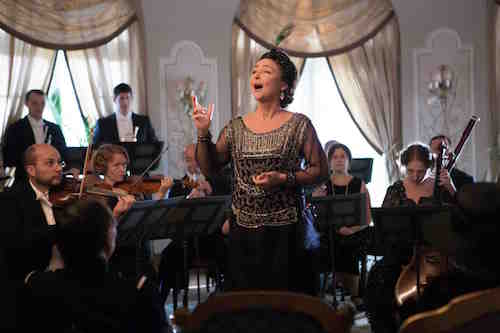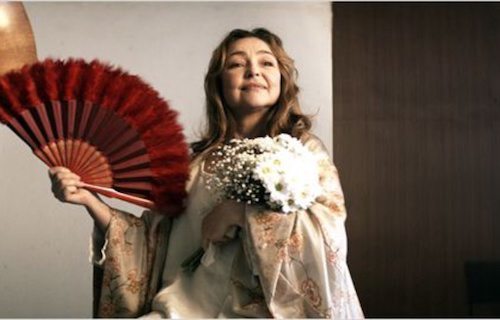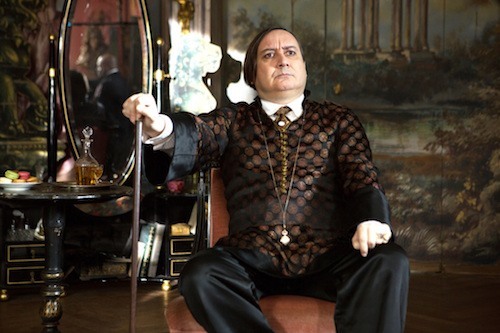The Grand Self-Delusion
The eponymous heroine of Xavier Giannoli’s film Marguerite is a tough sell on paper: a wealthy French socialite who fancies herself a great operatic singer, but who is in fact utterly tone-deaf. Yet, as played (with great sensitivity) by Catherine Frot in this French tragicomedy set in the early 1920s, Marguerite Dumont — at least when she’s not singing — is a warm, sympathetic presence with a true appreciation for music. We’re appalled by the sounds that come out of her mouth, but we can’t help but feel for this woman whose vulnerability and unhappiness is palpable.
The character is based on American socialite Florence Foster Jenkins, who has already inspired several plays as well as a forthcoming Hollywood film starring Meryl Streep. Where Jenkins was merely bad, Mme. Dumont is truly awful; her wild screeching performances are some of the most stunning (literally) moments in the film. This could have been fodder for an out-and-out farce, but though Giannoli’s unconventional movie has many humorous moments, it is also dark, poignant, and visually sumptuous.
The film begins with various people arriving at a benefit recital given in Marguerite’s opulent home. There’s young soprano Hazel (Christa Théret), arch young music critic Lucien (Sylvain Dieuaide) and his friend Kyril, an avant-garde artist (Aubrey Fenoy); we’re also introduced to Marguerite’s husband Georges (André Marcon), who pretends that his car broke down so he can avoid the concert. Several opening acts perform before Marguerite herself finally appears to sing the Queen of the Night aria from The Magic Flute, one of opera’s most challenging solos. Her rendition is so terrible we’re as shocked and perplexed as the recital audience: how can Marguerite not hear herself? Afterwards, the crowd — mostly members of a music club bankrolled by Marguerite — applauds enthusiastically, as Lucien and Kyril extol her wildness and abandon. Everyone gives Marguerite encouraging praise, but she herself seems a bit doubtful. Though delusional she’s clearly not arrogant.
Her household is complicit in her fantasy; Marguerite’s solicitous majordomo Madelbos (Denis Mpunga) takes dramatically staged photos of her in various costumes and hides her bad reviews. After reading Lucien’s obliquely positive write-up, Marguerite meets with him and Kyril, who invite her to sing in a public concert. This turns out to be a wildly avant-garde, Dada-ist spectacle during which Marguerite sings “La Marseillaise,” perceived by the audience as highly offensive (though she herself doesn’t understand why). Lucien, who genuinely likes Marguerite, begins to feel guilty about taking advantage of her naiveté.
Meanwhile we see that Georges, who is mortified by his wife’s avocation, is having an affair. The marriage has been failing for some time, though Marguerite is still clearly devoted him and he genuinely tries to protect her. After the “La Marseillaise” debacle, Marguerite is ejected from the music club, whose members have found a replacement patron. Rather than dampening her spirit, the performance has energized Marguerite, who longs to perform again in public. Georges forbids it, and it’s satisfying to see her stand up to him, even as we dread the impending spectacle.
Lucien finds a vocal coach, the flamboyant divo Pazzini (a very amusing Michel Fau) who is bribed into training Marguerite for her concert. (What fun to watch his face upon first hearing the first tortured notes of her audition aria.) Pazzini and his oddball crew set up shop at her house, living off of her largesse. At one point during their intense training sessions, a frustrated Pazzini almost tells her the truth, but he — like many others — just can’t bring himself to go there.
The drama of the buildup to the big concert is matched by the event itself, during which Marguerite performs in a giant pair of wings. Indeed, there is a Black Swan-like sense of doomed fantasy to this scene, which ends abruptly, if not exactly triumphantly.
The film has a few weaknesses: the concert’s aftermath and the ending feel a bit drawn-out and anti-climatic, a subplot involving Hazel and Lucien never quite gels, and the idea that Marguerite’s singing is mainly a bid for attention from her husband seems somewhat simplistic; but the pleasures of Marguerite far outweigh the drawbacks.
Marguerite opens Friday at the Paris Theatre and the Angelika Film Center.
— Marina Zogbi




